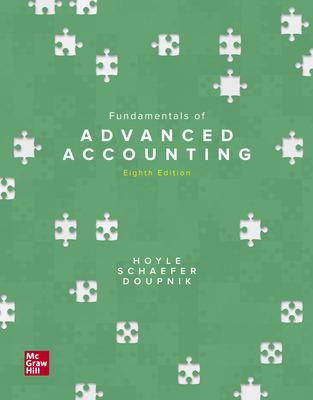Answered step by step
Verified Expert Solution
Question
1 Approved Answer
Jeff Lynne has prepared the following list of statements about corporations. 1. A corporation is an entity separate and distinct from its owners. 2. As
Jeff Lynne has prepared the following list of statements about corporations. 1. A corporation is an entity separate and distinct from its owners. 2. As a legal entity, a corporation has most of the rights and privileges of a person. 3. Most of the largest U.S. corporations are privately held corporations. 4. Corporations may buy, own, and sell property; borrow money; enter into legally binding contracts; and sue and be sued. 5. The net income of a corporation is not taxed as a separate entity. 6. Creditors have a legal claim on the personal assets of the owners of a corporation if the corporation does not pay its debts. 7. The transfer of stock from one owner to another requires the approval of either the corporation or other stockholders. 8. The board of directors of a corporation legally owns the corporation. 9. The chief accounting officer of a corporation is the controller. 10. Corporations are subject to less state and federal regulations than partnerships or proprietorships. Jeff Lynne (see E11-1) has studied the information you gave him in that exercise and has come to you with more statements about corporation. 1. Corporation management is both an advantage and a disadvantage of a corporation compared to a proprietorship or a partnership. 2. Limited liability of stockholders, government regulations, and additional taxes are the major disadvantages of a corporation. 3. When a corporation is formed, organization costs are recorded as an asset. 4. Each share of common stock gives the stockholder the ownership rights to vote at stockholder meetings, share in corporate earnings, keep the same percentage ownership when new shares of stock are issued, and share in assets upon liquidation. 5. The number of issued shares is always greater than or equal to the number of authorized shares. 6. A journal entry is required for the authorization of capital stock. 7. Publicly held corporations usually issue stock directly to investors. 8. The trading of capital stock on a securities exchange involves the transfer of already issued shares from an existing stockholder to another investor. 9. The market value of common stock is usually the same as its par value. 10. Retained earnings is the total amount of cash and other assets paid in to the corporation by stockholders in exchange for capital stock
Step by Step Solution
There are 3 Steps involved in it
Step: 1

Get Instant Access to Expert-Tailored Solutions
See step-by-step solutions with expert insights and AI powered tools for academic success
Step: 2

Step: 3

Ace Your Homework with AI
Get the answers you need in no time with our AI-driven, step-by-step assistance
Get Started


